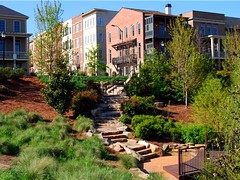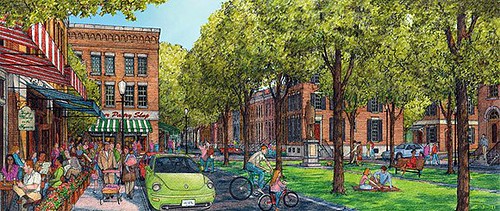Meet Glenwood Park, Atlanta's new showcase neighborhood of smart growth and green design

Posted July 22, 2009 at 1:20PM
If you're looking for an example of a newly designed and built neighborhood that embodies just about all things smart and green, I know of few that can rival Glenwood Park in Atlanta. Just a decade ago, the neighborhood's site was an abandoned industrial brownfield, pushed up against Interstate 20 in east Atlanta, two miles from downtown. Now it's one of the best places in the city to live, and also one of the most environmentally sustainable in the country.
The neighborhood has a nearly ideal walkable density: with full build-out its 28 acres will contain at least 350 residences, 50,000 square feet of retail space, and 20,000 square feet of offices. (According to various sources, those numbers could reach as many as 425 homes and 150,000 square feet of commercial space. I believe it is currently about two-thirds complete and occupied.)
The housing is a mixture of types and has been available at a variety of price points, with single-family, townhouses, and condos all part of the mosaic. This enables people of different ages and incomes all to live in the neighborhood. Glenwood Park is also well-served by public transit and well-connected to other nearby neighborhoods; its relatively central location means that its residents' rates of driving and carbon emissions from transportation will be much lower than metro Atlanta's regional average.
 Even better, Glenwood Park is a certified EarthCraft Community (sort of a local precursor to LEED-ND) for its superior performance in site selection, water management, planning and design, preservation landscaping, community involvement, and green building. The neighborhood was developed by Green Street Properties, founded by Charles Brewer (who also founded MindSpring).
Even better, Glenwood Park is a certified EarthCraft Community (sort of a local precursor to LEED-ND) for its superior performance in site selection, water management, planning and design, preservation landscaping, community involvement, and green building. The neighborhood was developed by Green Street Properties, founded by Charles Brewer (who also founded MindSpring).
The site had most recently been used as a concrete recycling facility, and was covered with 40,000 cubic yards of concrete when the project began. Buried underground were thirteen storage tanks and another 40,000 cubic yards of wood chips (to help with drainage?). All were removed, with appropriate testing, cleanup and disposal.
An excellent history appearing in the online publication Terrain.org, which highlights the neighborhood as an "UnSprawl Case Study," notes that a small amount of industrial land remains nearby, but the community is "primarily surrounded by century-old, single-family neighborhoods," including Grant Park, Ormewood Park and East Atlanta. "The surrounding neighborhoods suffered a sharp economic downturn in the 1960s, but have been on a gradual rebound since. They are racially and economically diverse."
According to the article on Terrain.org, the neighbors realized early on that Glenwood Park would bring needed amenities to their part of town and were supportive of the project throughout the permitting process.
Green Street's guiding philosophy for the community was articulated in 2001, and it is practically a manifesto of smart, green urbanism:
"Glenwood Park will be a real neighborhood that features a traditional fine-grained mix of different housing types as well as retail activity, office space, civic buildings, and recreational assets.
"Glenwood Park will offer a compelling alternative for those who are dissatisfied with the choices provided by conventional development. Conventional development emphasizes the private realm-privacy, exclusivity, bigger and bigger houses. Glenwood Park will emphasize the public realm-community, diversity, the quality and character of streets, and sidewalks, parks, plazas, and other public spaces.
"Glenwood Park will gracefully accommodate cars, but it will be designed for people. It will be very walkable. Cars will travel slowly, and sidewalk and street designs will emphasize pedestrian comfort and safety. There will be plenty of interesting things to walk to, because of the fine-grained mix of uses. And walks won't be too long, because the neighborhood will be relatively compact.
"The commercial center of Glenwood Park will have retail establishments that serve the practical everyday needs of both Glenwood Park and its surrounding neighborhoods-needs that are currently not well served. And because of its unique character and easy access, it will also act as home for businesses that are a destination for citizens of the entire metro area and beyond."
The results speak for themselves in the beautiful photos and renderings, and the community has earned a bunch of awards. (Full disclosure: the project was master-planned by Dover Kohl & Partners, where my friend Victor Dover is a principal. I knew I liked Glenwood Park before I realized that DK had been involved, though. Here is the firm's informative fact sheet on the project.)
Some of those awards have been environmental, and that's no surprise given some of the neighborhood's performance achievements:
- Green building features in the residential units built and occupied so far have meant that over the last two years, compared to conventional buildings, over five million pounds of CO2 have been prevented from entering the Earth's atmosphere, and over seven million gallons of potable water have been conserved.
 The site's superior location, walkability, and access will reduce vehicle miles driven per year by a cumulative 1.6 million compared to the regional average, the equivalent of removing over a hundred cars from the roadways.
The site's superior location, walkability, and access will reduce vehicle miles driven per year by a cumulative 1.6 million compared to the regional average, the equivalent of removing over a hundred cars from the roadways.- 259 million pounds of concrete on the site (an amount equal to an acre of concrete 36 feet deep!) were salvaged and reused.
- 800,000 pounds of granite ruble blocks and 250,000 pounds of metal were salvaged and reused (in addition to the wood chips, which were sent to an energy generation facility).
- Drought-resistant landscaping and on-site water recycling means that no potable water is needed for irrigation.
- Stormwater runoff has been reduced by the site's green infrastructure (see photos) to only one-third of what it would be on a "normal" site.
You can see some of the awards and media features on Glenwood Park here. It's an impressive list. Some of the community goings-on, which confirm that this is not only a highly functioning neighborhood but also a fun place to be, are here. All this, and I also read that the Matador Cantina in the neighborhood "offers one of the largest tequila selections in the city." Not bad, if you ask me.






